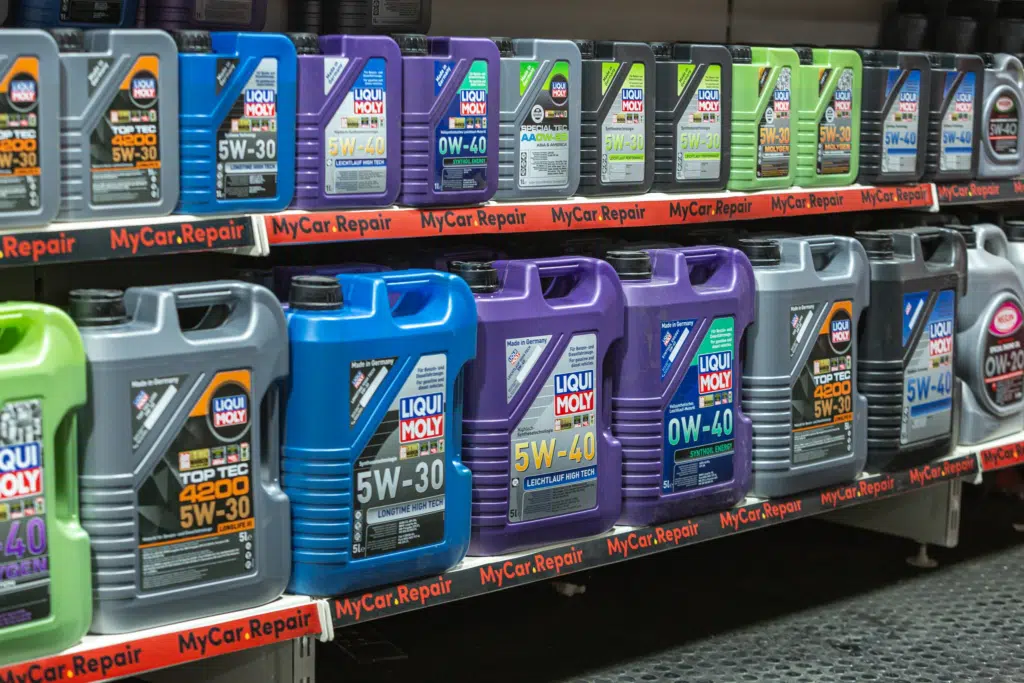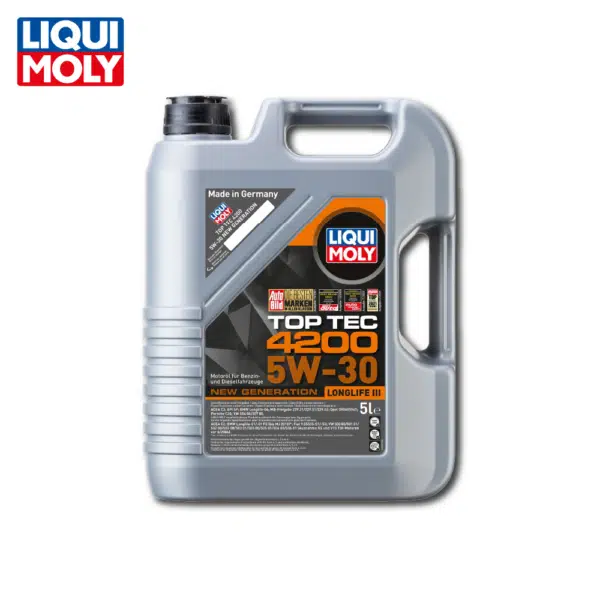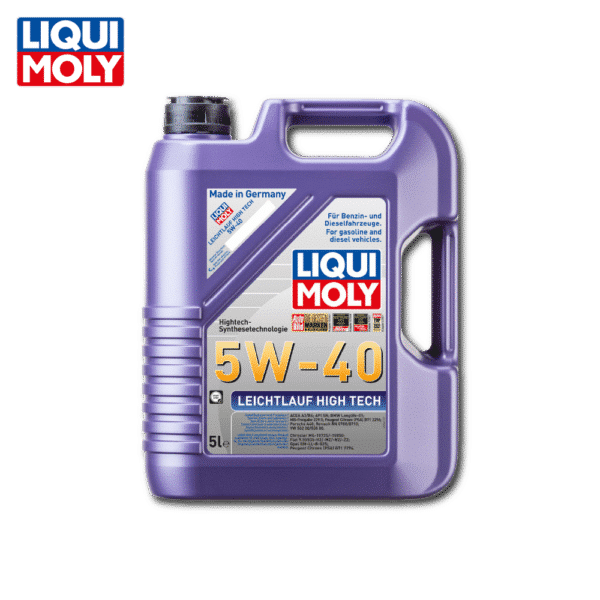Low SAPS (Sulphated Ash, Phosphorus, and Sulphur) engine oils are a type of motor oil that have been formulated to have lower levels of certain elements. These elements, commonly referred to as “ash-forming” elements, can have a negative impact on the performance and longevity of catalytic converters and diesel particulate filters (DPFs) in modern engines.
Low SAPS oils typically have lower levels of Sulphur, Phosphorus and Ash. This allows them to provide better protection for exhaust treatment systems, prolonging their lifetime, and reducing emissions. They are particularly useful for diesel engines that have a particulate filter, as they help to keep them in good working condition, reducing the need for costly repairs or replacements.
Low SAPS oils are also known as “Low-Ash” or “Ultra-Low SAPS” engine oils and they are commonly used in vehicles with diesel engines that meet the Euro IV, Euro V and Euro VI emissions standards. They are also used in some gasoline engines that are equipped with a three-way catalytic converter. It’s important to check your vehicle’s owner’s manual or consult with a dealer to confirm the correct oil specification for your specific vehicle and model year.
What are the best low SAPS engine oils?
There are several high-quality low-SAPS engine oils available on the market from various manufacturers, including Mobil 1, Castrol, Shell, Valvoline, and Liqui Moly. These oils are formulated to meet the ACEA (Association des Constructeurs Européens d’Automobiles) and the OEM standards, providing the best protection and performance for your engine.

Some examples of high-quality low-SAPS engine oils include:
-
LIQUI MOLY Top Tec 4200 5W-30 New Generation£16.97 – £58.89
Liqui Moly Top Tec 4200 5W-30 (Low SAPS C4)
Mobil 1 ESP Formula 5W-30 (Low SAPS C1)
Castrol Edge Professional LongLife III 5W-30 (Low SAPS C2)
Shell Helix Ultra Professional AG 5W-30 (Low SAPS C3)
Valvoline Advanced Full Synthetic Diesel Motor Oil 5W-40 (Low SAPS C4)
It’s important to note that the best low SAPS engine oil for your vehicle depends on the specific make, model, and engine type. Additionally, the availability of these products may vary depending on your location. It’s always good to check the OEM or the manufacturer’s website or consult with a dealer for the latest information on the products they offer and their recommended uses. Also, always check the owner’s manual for the correct oil specification for your vehicle.
What is the difference between LOW SAPS C1, C2, C3, C4?
Low SAPS C1, C2, C3, and C4 are different classifications of engine oils that are formulated to meet the ACEA (Association des Constructeurs Européens d’Automobiles) oil standards. These standards are used to classify engine oils based on their performance and suitability for use in gasoline and diesel engines.
Low SAPS C1 oils are designed for use in diesel engines that meet the Euro 6 emissions standard. They have a low ash, phosphorus and sulfur content, which helps to protect catalytic converters and diesel particulate filters (DPFs) in these engines. They are also suitable for use in gasoline engines that are equipped with a three-way catalytic converter.
Low SAPS C2 oils are also designed for use in diesel engines that meet the Euro 6 emissions standard, but they have even lower ash, phosphorus and sulfur content than C1 oils. They are also suitable for use in gasoline engines that are equipped with a three-way catalytic converter.
Low SAPS C3 oils are also designed for use in diesel engines that meet the Euro 6 emissions standard, but they have even lower ash, phosphorus and sulfur content than C2 oils. They are also suitable for use in gasoline engines that are equipped with a three-way catalytic converter and engines that have higher power outputs and more demanding operating conditions.
Low SAPS C4 oils are designed for use in diesel engines that meet the Euro 6 emissions standard, but they have even lower ash, phosphorus and sulfur content than C3 oils and are also suitable for use in diesel engines that have particulate filters (DPF).
It’s important to check your vehicle’s owner’s manual or consult with a dealer to confirm the correct oil specification for your specific vehicle and model year. Also, keep in mind that the standards and the lubricant requirements can change over time.
Are Low SAPS oils the same as low ash oils?
Low SAPS (Sulphated Ash, Phosphorus, and Sulphur) oils and low-ash oils are similar in that they both have lower levels of certain elements that can have a negative impact on the performance and longevity of catalytic converters and diesel particulate filters (DPFs) in modern engines. However, they are not exactly the same.
Low SAPS oils are formulated to have lower levels of Sulphur, Phosphorus, and Ash, which are known as “ash-forming” elements. These elements can have a negative impact on exhaust treatment systems, such as catalytic converters and diesel particulate filters (DPFs) in modern engines. Low SAPS oils are particularly useful for diesel engines that have a particulate filter, as they help to keep them in good working condition, reducing the need for costly repairs or replacements.
Low ash oils, on the other hand, are formulated to have lower levels of Ash only. Ash is a by-product of lubricant combustion and it can accumulate in engines, especially in diesel engines that have a particulate filter. Low ash oils can help to prevent the build-up of ash in these engines and prolong the life of the particulate filter.
In summary, Low SAPS oils are formulated to have lower levels of Sulphur, Phosphorus and Ash, while low ash oils are formulated to have lower levels of Ash only. Both of them are designed to protect the exhaust treatment systems in modern engines, but low SAPS oils provide more complete protection by reducing the levels of three elements instead of one.
Which LIQUI MOLY oils are low saps?
Liqui Moly is a reputable brand that offers a variety of low-SAPS (Sulphated Ash, Phosphorus, and Sulphur) engine oils. These oils are formulated to meet the ACEA (Association des Constructeurs Européens d’Automobiles) and OEM standards, providing the best protection and performance for your engine.

Examples of Liqui Moly low-SAPS engine oils include:
-
LIQUI MOLY Synthoil Longtime Plus 0W-30£29.06 – £75.89
-
LIQUI MOLY Leichtlauf High Tech 5W-40£19.89 – £48.64
-
LIQUI MOLY Top Tec 4200 5W-30 New Generation£16.97 – £58.89
LIQUI MOLY Leichtlauf High Tech 5W-40 (Low SAPS C1)
LIQUI MOLY Leichtlauf High Tech 5W-30 (Low SAPS C1)
LIQUI MOLY Synthoil Energy 0W-40 (Low SAPS C1)
LIQUI MOLY Synthoil Longtime Plus 0W-30 (Low SAPS C1)
LIQUI MOLY Top Tec 4200 5W-30 (Low SAPS C4)
It’s important to note that this list may not be exhaustive and that the products and their availability may vary depending on your location. It’s always good to check the Liqui Moly website or contact the company directly to get the latest information on the products they offer and their recommended uses. Also, always check the owner’s manual for the correct oil specification for your vehicle.
What impact do low saps engine oils have on emissions?
Low SAPS (Sulphated Ash, Phosphorus, and Sulphur) engine oils are formulated to have lower levels of certain elements that can have a negative impact on the performance and longevity of catalytic converters and diesel particulate filters (DPFs) in modern engines. These elements, commonly referred to as “ash-forming” elements, can contribute to emissions if they are not kept at low levels.
The use of low SAPS engine oils can have a positive impact on emissions by reducing the levels of ash, phosphorus, and sulfur in engine oil. These elements can accumulate in the exhaust treatment systems, such as catalytic converters and diesel particulate filters (DPFs), reducing their efficiency and potentially leading to increased emissions.
By reducing the levels of ash, phosphorus, and sulfur, low SAPS engine oils help to keep the exhaust treatment systems clean and functioning properly. This, in turn, can help to reduce emissions from the engine, making the vehicle more environmentally friendly.
It’s important to note that using a low SAPS oil alone may not be enough to achieve the desired emission reductions. Other factors such as vehicle maintenance, driving habits, and the age of the vehicle also play a role in emissions. Additionally, it’s always good to check the owner manual for the correct oil specification for your vehicle and to consult with a dealer to ensure that you are using the appropriate oil for your specific make and model.
Which low SAPS oil fits my car?
Low SAPS oils that are suitable for use in Mercedes-Benz vehicles include:
Mobil 1 ESP Formula 5W-30 (Low SAPS C1)
Castrol Edge Professional LongLife III 5W-30 (Low SAPS C2)
Shell Helix Ultra Professional AG 5W-30 (Low SAPS C3)
Valvoline Advanced Full Synthetic Diesel Motor Oil 5W-40 (Low SAPS C4)
LIQUI MOLY Synthoil Energy 0W-40 (Low SAPS C1)
LIQUI MOLY Synthoil Longtime Plus 0W-30 (Low SAPS C1)
Low SAPS oils that are suitable for use in Audi vehicles include:
Mobil 1 ESP Formula 5W-30 (Low SAPS C1)
Castrol Edge Professional LongLife III 5W-30 (Low SAPS C2)
Shell Helix Ultra Professional AG 5W-30 (Low SAPS C3)
Valvoline Advanced Full Synthetic Diesel Motor Oil 5W-40 (Low SAPS C4)
LIQUI MOLY Synthoil Energy 0W-40 (Low SAPS C1)
LIQUI MOLY Leichtlauf High Tech 5W-30 (Low SAPS C1)
Low SAPS oils that are suitable for use in BMW vehicles include:
Mobil 1 ESP Formula 5W-30 (Low SAPS C1)
Castrol Edge Professional LongLife III 5W-30 (Low SAPS C2)
Shell Helix Ultra Professional AG 5W-30 (Low SAPS C3)
Valvoline Advanced Full Synthetic Diesel Motor Oil 5W-40 (Low SAPS C4)
LIQUI MOLY Synthoil Energy 0W-40 (Low SAPS C1)
Low SAPS oils that are suitable for use in VW vehicles include:
Mobil 1 ESP Formula 5W-30 (Low SAPS C1)
Castrol Edge Professional LongLife III 5W-30 (Low SAPS C2)
Shell Helix Ultra Professional AG 5W-30 (Low SAPS C3)
Valvoline Advanced Full Synthetic Diesel Motor Oil 5W-40 (Low SAPS C4)
LIQUI MOLY Synthoil Energy 0W-40 (Low SAPS C1)
LIQUI MOLY Leichtlauf High Tech 5W-30 (Low SAPS C1)
Frequently Asked Questions (FAQs) about Low SAPS engine oils:
- What are Low SAPS engine oils?
- Low SAPS (Sulphated Ash, Phosphorus, and Sulphur) engine oils are motor oils formulated to have reduced levels of specific elements, namely Sulphur, Phosphorus, and Ash. These elements, termed “ash-forming,” can adversely affect the performance and lifespan of catalytic converters and diesel particulate filters (DPFs) in modern engines. These oils provide better protection for exhaust treatment systems, reduce emissions, and are especially useful for diesel engines equipped with a particulate filter.
- How do Low SAPS C1, C2, C3, and C4 oils differ from one another?
- These are classifications based on the ACEA (Association des Constructeurs Européens d’Automobiles) oil standards. They determine the suitability of the oil for gasoline and diesel engines:
- Low SAPS C1: For diesel engines meeting the Euro 6 emissions standard, with low ash, phosphorus, and sulfur. Suitable also for gasoline engines with a three-way catalytic converter.
- Low SAPS C2: Similar to C1 but with even lower ash, phosphorus, and sulfur.
- Low SAPS C3: Similar to C2, but suitable for gasoline engines with higher power outputs and challenging operating conditions.
- Low SAPS C4: Tailored for diesel engines meeting Euro 6 standards with the lowest ash, phosphorus, and sulfur content, also apt for diesel engines having particulate filters (DPF).
- Is there a difference between Low SAPS oils and Low Ash oils?
- Yes, while both are designed to protect modern engine exhaust systems, Low SAPS oils are formulated to reduce levels of Sulphur, Phosphorus, and Ash. In contrast, Low Ash oils focus solely on reducing Ash content.
- Which LIQUI MOLY oils are categorized as Low SAPS?
- Some examples of LIQUI MOLY Low SAPS engine oils include:
- LIQUI MOLY Leichtlauf High Tech 5W-40 (Low SAPS C1)
- LIQUI MOLY Leichtlauf High Tech 5W-30 (Low SAPS C1)
- LIQUI MOLY Synthoil Energy 0W-40 (Low SAPS C1)
- LIQUI MOLY Synthoil Longtime Plus 0W-30 (Low SAPS C1)
- LIQUI MOLY Top Tec 4200 5W-30 (Low SAPS C4)
- How do Low SAPS engine oils impact vehicle emissions?
- Low SAPS engine oils positively affect emissions. Their reduced levels of ash, phosphorus, and sulfur prevent these elements from accumulating in exhaust treatment systems like catalytic converters and diesel particulate filters (DPFs). This prevention ensures the systems’ proper functioning, which in turn helps to diminish engine emissions.
Remember, it’s always recommended to consult your vehicle’s owner’s manual or a dealer to ensure the appropriate oil specification for your specific make and model.



